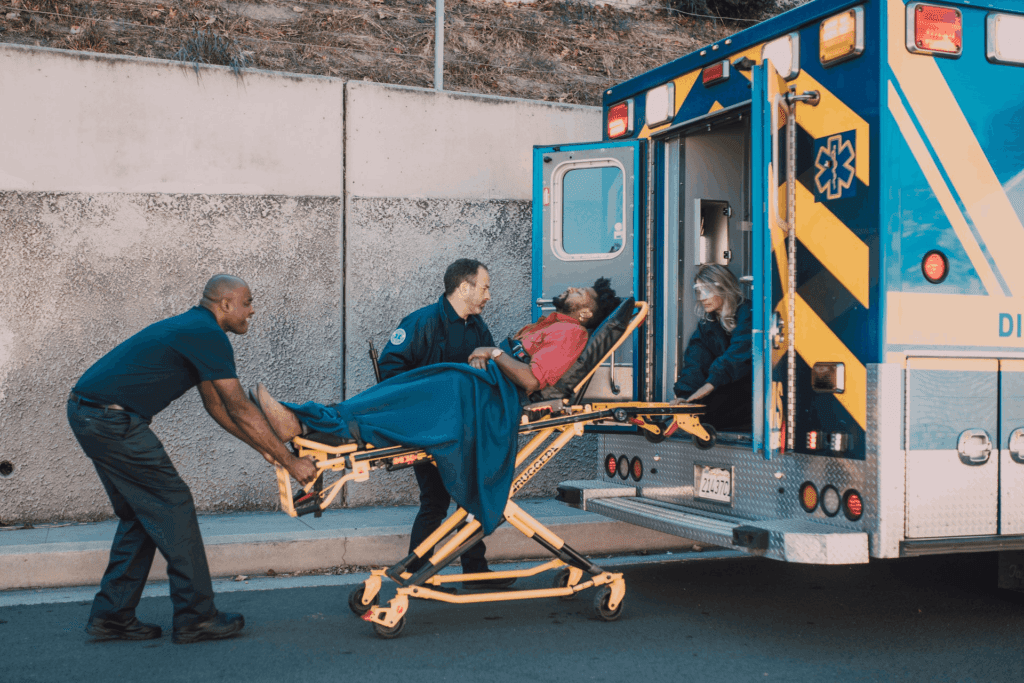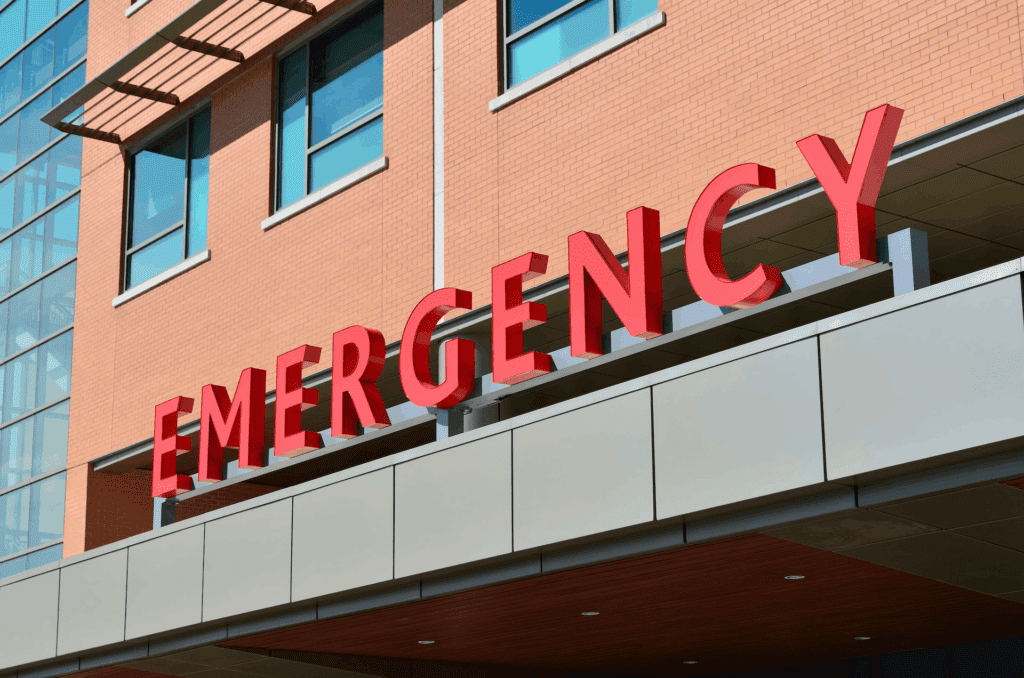According to the Centers for Disease Control and Prevention, motor vehicle accidents caused over 2.1 million emergency department visits in 2020. Although minor injuries can heal without medical intervention, others require urgent medical care and hospitalization.
In the worst circumstances, car accident injuries can result in wrongful death. The World Health Organization (WHO) reports that road traffic injuries are responsible for approximately 1.3 million fatalities yearly.
Car accident victims must take several crucial actions after sustaining an injury. Seeking prompt medical treatment should be a priority, as it protects your health and prevents further injuries, and helps preserve your rights to compensation.
Delaying getting medical attention may present more challenges in pursuing a personal injury case. A car accident lawyer will be valuable in obtaining the compensation you’re legally entitled to recover.
Still, knowing about typical hospital car accident injuries and their legal implications is in your best interest.
Key Takeaways
|
Most Common Hospital Car Accident Injuries
Injuries from car accidents can vary depending on the circumstances leading to the collision, ranging from minor cuts and bruises to severe and fatal injuries. After the crash, it can be tempting to skip medical care, especially if you believe your injuries are not serious.
However, even minor car accident injuries can cause discomfort and distress, especially if they occur in sensitive areas of the body. The adrenaline rush after a traumatic event like a car accident can significantly increase your body’s pain threshold, masking the immediate manifestations of even serious injuries.
Regardless of your condition after an accident, seeking medical attention before heading home is always advisable.
Treatments for car accident injuries can range from first aid at the crash scene to a prolonged hospital stay. The following are examples of car accident injuries that are more likely to result in hospitalization.
Soft tissue injuries
Blunt force trauma from a car accident can cause stretching of the body’s soft tissues, resulting in partial or complete tears. Soft tissue injuries often affect the knee, ankle, shoulder, and wrist.
While some soft tissue injuries may heal with home treatment, others require physiotherapy or pain relief medication. More severe soft tissue injuries may require surgery. The following are common soft tissue injuries sustained from car accidents:
- Contusions
Commonly known as bruises, contusions are a type of injury that causes bleeding and tissue underneath the skin. In a car accident, the impact can break the tiny blood vessels under the skin, resulting in swelling, redness, or bluish discoloration.
Most contusions heal on their own, but severe bruises on internal organs can be life-threatening as they can interfere with organ function.
Organ contusions may require intensive treatment, which may involve hospitalization. A doctor may have to perform a surgical procedure to repair the injury or stop the bleeding. Frequent monitoring of vital signs is also crucial, especially in kidney or lung contusion cases.
- Sprains and strains
The forceful impact of a car crash can jolt your body, causing overstretching of the muscles, tendons, and ligaments. This can result in sprains and strains after the accident. Typically, doctors require X-rays on the affected area to rule out fractures or broken bones.
While sprains and strains may seem minor, these injuries can cause severe pain and loss of range of motion. They may force injured accident victims to miss work.
Sprains and strains usually heal with minimal treatment. Still, in some cases, accident victims can partially or wholly tear a tendon or ligament, requiring surgery to put the torn pieces back together. Total muscle function loss may also require intensive hospital treatment to regain strength and function.
Back and neck injuries
The forceful impact of a collision can throw you from your vehicle, causing you to crash into objects inside and outside of it. This sudden movement can forcefully thrust your head and neck forward and back., resulting in potential injuries.
Back pain after a car accident can range in severity from mild and dull aches to persistent and debilitating pain, limiting mobility and disrupting everyday activities, leading to diminished quality of life.
It’s common to experience neck pain after a car wreck since your neck is usually unprotected and susceptible to injury due to its location.
Seeing a medical professional is essential, especially if you experience pain in your back and neck after being involved in an accident. Examples of back and neck injuries are the following:
- Whiplash
Whiplash is a common neck injury caused by sudden, forceful vehicle movement during a collision. Treatment for a whiplash injury depends on the severity of your symptoms. Most accident victims only need at-home treatment and recover within a few weeks.
However, others may need specialized pain treatment at the hospital. Although rare, spine surgery may also be necessary, particularly in torn ligaments or fractured vertebrae cases.
- Herniated disc
Even low-speed collisions can cause herniated disc injuries in accident victims, commonly in the lower back and neck areas. Initial treatments for a herniated disc are often non-surgical.
However, if physical therapy and medications don’t relieve the pain, your doctor may recommend surgical procedures for herniated discs. You may need to stay at the hospital for several days afterward. The length of hospitalization will depend on your recovery progress, but patients can expect to remain there for four to five days.
Head and brain injuries
A car accident’s most severe and long-lasting physical harm often involves head, skull, and brain injuries. Receiving hospital treatment is critical for a head injury that results in bleeding or damage to the brain.
Additionally, blood clots can sometimes form in the brain, exerting pressure and posing a life-threatening risk. Therefore, it’s crucial to seek immediate medical attention. A doctor will examine any visible cuts, bruises, or bleeding that may indicate any possible head injury from the crash.
Traumatic brain injury (TBI) is among the most common head injuries sustained in a car accident. Its impact can vary from mild to severe, depending on the degree of the head trauma. However, a severe TBI may result in loss of consciousness lasting more than six hours.
In such cases, accident victims will likely need hospital care and more intensive treatments from various medical professionals. It may involve the general medical team, intensive care specialists, rehab therapists, and neuropsychologists.
Spinal cord injuries
Most spinal cord injuries are trauma-based, and motor vehicle accidents are one of the common causes. The spinal cord is a complex organ that transmits sensory signals between your body and brain. So even if it’s not severely injured, any damage can lead to difficulty functioning.
A spinal cord injury can be complete, meaning total paralysis below the area of the damage. This type of injury may cause loss of function in all four limbs or the lower half of the body.
Meanwhile, an incomplete spinal cord injury refers to partial damage to the spinal cord. Since the body can still communicate along specific pathways, the injured victim may still have the ability to move and feel.
Most people with spinal cord injuries may need long-term hospital stays and physical rehabilitation. After hospitalization and therapy, frequent medical evaluations and testing may also be necessary to monitor progress.
Internal injuries
A car crash can violently collide your body into an object or cause you to be struck by debris, damaging your internal organs. These injuries may not produce apparent symptoms, leaving them undetected and potentially developing into more life-threatening conditions.
Internal bleeding is a serious consequence of physical trauma in a car accident that can result in organ failure and even death if left untreated. Indications of internal bleeding include contusions that persist for several weeks and symptoms such as low blood pressure, slurred speech, and light-headedness.
If internal bleeding is suspected, visit a medical facility for treatment and hospitalization immediately.
Legal Implications of Hospital Car Accident Injuries


The legal implications of a car accident injury depend on numerous factors, including the severity of your injuries, the circumstances surrounding the accident, and the laws applicable in the jurisdiction the crash happened.
Remember that seeking legal counsel is the best way to deal with the financial and legal consequences of hospital car accident injuries. The following information may benefit you in making well-informed decisions throughout the process.
Who is liable for your car accident injuries?
Understanding how liability is established can help ensure that you are not held financially responsible for the negligent actions of others.
Several factors come into play when determining who is liable for your hospital car accident injuries and other losses. However, who pays for your damages depends primarily on the laws of the state where the accident occurred.
- No-fault states
Drivers must have minimum personal injury protection (PIP) coverage in no-fault states. After an accident, each driver’s
In these states, fault has no bearing in pursuing compensation. Regardless of who is responsible for the crash, PIP
However, there are only specific circumstances where you can seek damages from the negligent party in no-fault states. For example, you may pursue legal action against the at-fault driver if you sustain severe injuries and long-term difficulty. Note that states may have different ways of defining severity.
- At-fault states
Meanwhile, in at-fault states, a driver who caused the crash must compensate the injured party for their injuries and losses.
In some cases, determining who is at fault in a car accident can be straightforward. For instance, a driver violates a traffic law and causes an accident. They’re responsible for paying the costs. However, there are situations where determining fault is more complicated.
Typically,
That’s why having a car accident lawyer is crucial after sustaining a hospital car accident injury. A lawyer can help you collect the necessary evidence that proves the other driver involved was at fault.
There are also situations where a hospital may miss a diagnosis or provide an incorrect diagnosis, exacerbating your hospital car accident injuries and reducing your chances of recovering damages.
Suppose medical care or treatment leads to further injury. You can still pursue compensation for your injuries and losses. Potentially liable parties in this scenario may include the physician, emergency room staff, or any medical professional who caused harm during the treatment.
The at-fault driver can be held accountable for all superseding negligent acts in the casual chain under the common law doctrine of the eggshell skull rule and the approximate and foreseeable causation. The defendant’s liability may only apply to injuries that were a reasonably foreseeable consequence of their negligence.
Unfortunately, medical mistakes are all too common. As a result, many forms of medical malpractice may be considered reasonably foreseeable when a car accident victim is undergoing treatment for their injuries. This means that the driver who caused the crash can also be responsible for damages resulting from medical malpractice while treating car accident victims.
What are the recoverable damages?
If you’re injured in a car crash that wasn’t your fault, you can seek compensation through a personal injury claim. The money awarded in such cases is known as damages, and it covers your losses and expenses resulting from someone else’s negligence.
Damages can fall into the following categories:
- Economic damages
These compensate you for direct financial losses related to your accident. They have monetary value, making them easier to quantify and prove through bills, invoices, and receipts. They may also include past and future medical expenses, property damage, and loss of wages.
In some cases, expert testimony may also be necessary to establish economic damages.
- Non-economic damages
These provide compensation for your intangible losses as a result of your injuries. Unlike economic losses, these damages are harder to quantify. Depending on the situation, non-economic damages may include pain and suffering, loss of consortium, and diminished quality of life.
- Punitive damages
Punitive damages don’t compensate you for your hospital car accident injuries and losses. Instead, it punishes the negligent parties for their egregious behavior. Punitive damages also aim to deter other individuals from engaging in similar misconduct.


How can you obtain maximum compensation for your car accident injury?
The maximum compensation you can recover for your car accident injury depends on various factors, but prompt action can significantly impact your case.
The most important step is to seek immediate medical care from the hospital after a car accident to ensure the maximum possible compensation for your damages. Proper medical records will help prove and link your injuries to the accident.
Adjusters will use any gap in treatment to discredit your injuries and argue that they’re not as severe as you claim. If you don’t seek prompt medical attention or fail to attend a follow-up treatment, insurers can use it as evidence to reduce or devalue your claim.
Regardless of how insignificant your injuries may appear after the crash, always seek prompt medical attention. Obtaining legal help after a hospital car crash injury is also wise to ensure fair compensation.
Why should you hire a lawyer for hospital car accident injuries?
Injuries can result in overwhelming hospital bills and other losses. Suppose you sustained hospital car accident injuries due to someone else’s negligence. You can obtain compensation for all your medical expenses and other losses.
Many accident victims decide to handle personal injury claims on their own. But lacking knowledge of personal injury law can lead to costly mistakes or hurt your chances of getting fair compensation.
Although optional, hiring a personal injury lawyer can be beneficial. Dealing with
Moreover,
A personal injury attorney can handle all communications and paperwork on your behalf, ensuring your rights are not compromised. With their experience and strong negotiation skills, lawyers can help get you a larger and more favorable settlement.
These attorneys also have connections with reputable medical care facilities that provide reasonable charges, which
Did you know?
Around 4.8 million additional roadway users were severely injured in crashes In 2020, costing the US economy $474 billion.
Connect With an Experienced Car Accident Attorney
Car accidents cause life-threatening injuries that require extensive medical treatments and prolonged hospital stays. Hospitalization is a significant source of expensive medical expense after an injury, with just a few days of hospital stay quickly amounting to several thousand dollars.
You don’t have to deal with the financial burdens of hospital car accident injuries alone. With the help of an experienced car accident lawyer, you can recover the costs of your hospital bills and other losses. They can investigate the accident and make the liable party accountable for the compensation you legally deserve.
If you or someone you love sustained hospital car accident injuries, seek legal assistance from The Personal Injury Center. We provide a free consultation to match you up with a personal injury lawyer specializing in car accident cases.
Protect your rights with an experienced car accident lawyer after a crash. Visit The Personal Injury Center for the best legal assistance.
FAQs on Hospital Car Accident Injuries
What types of car accidents are more likely to cause severe and life-threatening injuries?
When a car accident happens at high speeds or involves a pedestrian, the likelihood of sustaining severe and life-threatening injury increases significantly. Certain types of auto collisions are more likely to result in fatalities, including the following:
- Head-on collisions
- T-bone accidents
- Rollover accidents
- Accidents involving pedestrians
How much is the average settlement amount for a car accident case?
Numerous factors determine the settlement for a car accident, such as the extent of damage suffered. In 2020, the average bodily injury claim after a crash was $20,235, while property damage claims averaged $4,711. However, keep in mind that these are just averages. Consulting with a lawyer will give you a more accurate understanding of the potential settlement range for your case.
What kinds of evidence should you collect after a car crash?
You'll need sufficient proof to establish liability for the accident and its injuries. Here are some types of evidence you should gather after a car crash.
- Photographs of the crash scene and the extent of damage the collision caused
- Video footage of the car accident, if available
- A copy of the police report
- Witness statements regarding what they saw during the accident
- Medical records and receipts related to your injuries
- Receipts and photos of any vehicle damage and repairs
- Documentation for loss of income



